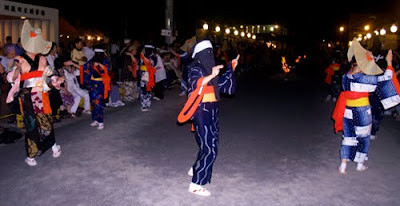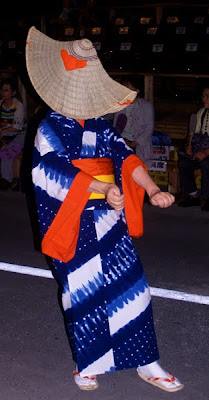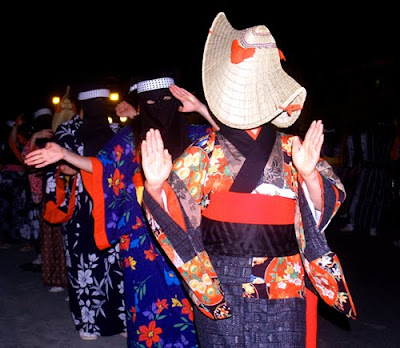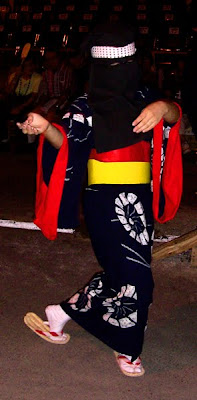Japanese Festivals known as Matsuri are fun events to attend. They represent old and new Japan from old farming rituals to Buddhist ceremonies to Anime parades. Here is a collection of photographs, videos, and stories of my experiences with Japanese festivals. You can search Festivals by keywords directly or by month, region, and type. Feel free to post questions!
Showing posts with label August. Show all posts
Showing posts with label August. Show all posts
Thursday, March 10, 2011
Koenji Awa Odori Festival
TIME: Last Weekend of August
PLACE: Koenji, Tokyo
GETTING THERE: Chuo Line
Awa Odori is a traditional dance from the Shikoku region. Its popularity has spread throughout Japan. Koenji is the second largest Awa Odori Festival outside of Shikoku with over ten thousand dancers. They've been doing the Awa Odori for several decades and it's one Tokyo's largest summer festivals.
Click here for their website
This event coincided with a Youtube Gathering. J-vlogger Ken Tanaka organized a summer youtube gathering Aug 29th at Kichijoji Park. I got there late just as it was winding down and the mosquitos were winding up to dine on the intoxicating blood of inebriated youtubers. A group of us decided to go to the Koenji Awa Odori festival.
Nishimonai Bon Odori - Dance for the Dead
The Japanese festival of Nishimonai Bon Odori
Japanese Town Dances to Remember the Dead
Obon is the time in Japan to pay respect to ancestral spirits. Japanese will travel to their home towns in order to pray at their ancestors’ graves. It’s believed the spirits of the departed return during the 3-day holiday – mainly in mid-August. These returning spirits are not to be feared like the ones that come with Halloween. In fact, they are welcomed and many communities put on a variety of celebrations.
One of the most common features of Obon is the Bon Odori, a special dance for Obon. Bon Odori dances vary from region to region each having their own particular form.
In the small town of Nishimonai in the northern prefecture of Akita, the locals perform a Bon Odori which is a mixture of an old harvest dance and a memorial to a fallen samurai lord.
The Nishimonai Bon Odori is unique in that some of the dancers were a black hood to represents the spirits of the deceased. Other dancers wear a patchwork kimono of silk fabric known as hanui and a woven straw hat called a amigasa.
The dancers’ faces are obscured by the hoods and straw hats giving the dance a surreal ghostly-like quality.
The singers sing in the old Akita dialect which many Japanese outside of Akita have difficulty understanding.
Japanese Town Dances to Remember the Dead
Nishimonai Bon Odori – Japanese Dance for the Dead
Obon is the time in Japan to pay respect to ancestral spirits. Japanese will travel to their home towns in order to pray at their ancestors’ graves. It’s believed the spirits of the departed return during the 3-day holiday – mainly in mid-August. These returning spirits are not to be feared like the ones that come with Halloween. In fact, they are welcomed and many communities put on a variety of celebrations.
Some dancers wear a black hood to represent deceased spirits
One of the most common features of Obon is the Bon Odori, a special dance for Obon. Bon Odori dances vary from region to region each having their own particular form.
Some of the dancers wear a straw hat known as amigasa
In the small town of Nishimonai in the northern prefecture of Akita, the locals perform a Bon Odori which is a mixture of an old harvest dance and a memorial to a fallen samurai lord.
The Nishimonai Bon Odori is unique in that some of the dancers were a black hood to represents the spirits of the deceased. Other dancers wear a patchwork kimono of silk fabric known as hanui and a woven straw hat called a amigasa.
Some dancers wear hanui a patchwork kimono of silk fabric
The dancers’ faces are obscured by the hoods and straw hats giving the dance a surreal ghostly-like quality.
The singers sing in the old Akita dialect which many Japanese outside of Akita have difficulty understanding.
The Nishimonai Bon Odori takes place just after the traditional dates for Obon from August 16-18, the big day being the 18th where the dance lasts for several hours in the evening.
TIME: August 18th - evening
PLACE: Ugo city, Akita Prefecture, Tohoku
GETTING THERE: Bus or car from Yuzawa
Tuesday, March 8, 2011
Kuroishi Neputa Festival (2010)
Kuroishi Neputa Matsuri 2010
Kuroishi Neputa Matsuri is a Japanese festival in the small town of Kuroishi in the Aomori prefecture in the northern Japanese region called Tohoku. For the festival, the people of Kuroishi make floats of washi - japanese paper - and paint them with scenes from Japanese and Chinese history and legends. The floats are illuminated from within so it makes for some beautiful artwork.
The festival derives from the larger Neputa/Nebuta festivals of Aomori City and Hirosaki which goes back centuries. No one is quite sure of the origin of this festival. Some say it's a victory celebration of an old samurai general over the local inhabitants while others say it comes from farmers as a means of warding off the sleepiness that comes in summer.
TIME: First Week of August - evening time around 6-7
LOCATION: Kuroishi, Aomori Prefecture, Tohoku
GETTING THERE: Konan Train from Hirosaki (30 mins)
Kuroishi Neputa Matsuri is a Japanese festival in the small town of Kuroishi in the Aomori prefecture in the northern Japanese region called Tohoku. For the festival, the people of Kuroishi make floats of washi - japanese paper - and paint them with scenes from Japanese and Chinese history and legends. The floats are illuminated from within so it makes for some beautiful artwork.
The festival derives from the larger Neputa/Nebuta festivals of Aomori City and Hirosaki which goes back centuries. No one is quite sure of the origin of this festival. Some say it's a victory celebration of an old samurai general over the local inhabitants while others say it comes from farmers as a means of warding off the sleepiness that comes in summer.
TIME: First Week of August - evening time around 6-7
LOCATION: Kuroishi, Aomori Prefecture, Tohoku
GETTING THERE: Konan Train from Hirosaki (30 mins)
A scene from the Chinese tale "The Three Kingdoms"
The Hero Minamoto no Yoshitune with his mythical trainers
the Tengu
Tengu are Japanese Goblins who help or trick humans
Date Masamune - 16th Century warlord of the Tohoku Region
Subscribe to:
Posts (Atom)












































